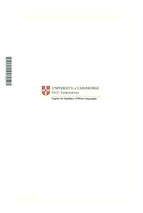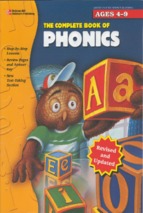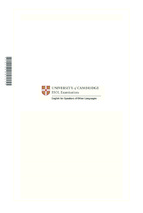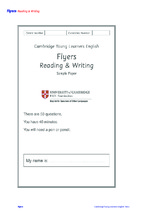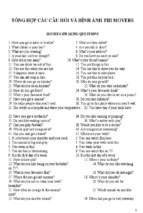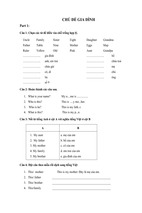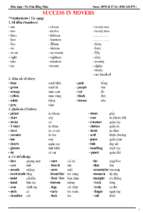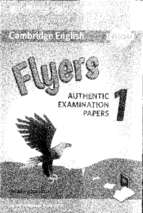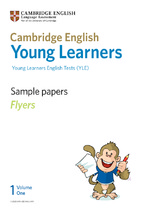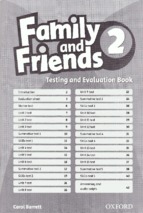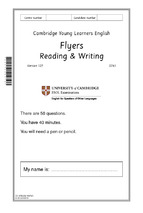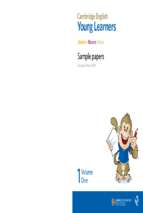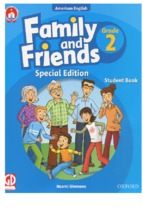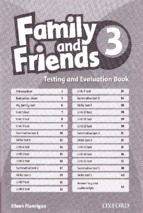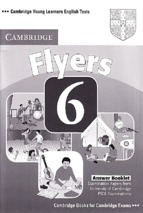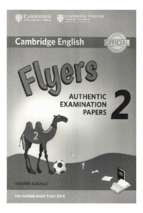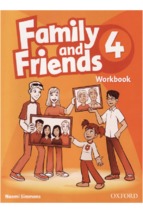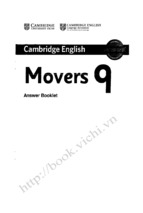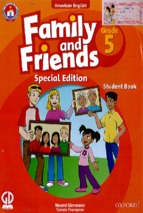ielts trainer 2 general answer keys_2019 34p
Test 1
KEY
LiSTEning PART 1
Useful strategy: deciding what to write in the spaces
Training
Useful language: spelling
1 1 E
2 A 3 I
4 R
6 U
7 P 8 J 9 S
10 N
11 X 12 D
2 1 PETERSON
2 YOSHIYUKI
3 AWANUI
4 FAIRVIEW
5 BARTHOLOMEW
6 DELANEY
Which space needs ….
5 Y
Useful language: numbers
1 1 027 9901 3436
2 13
3 £237
4 114
5 310
6 AXJ0577120.
Useful language: times and dates
1 1 August 3rd/ 3rd August / 3 August/ August 3
2 5.15
3 May 18th
4 autumn
5 July 27th / 27th July/ 27 July/ July 27
6 February 8th/ 8th February / 8 February/ February 8
Useful language: recognising when the answer
is coming
1 1 B 2 E 3 F 4 A 5 D 6 C
a date?
8
a price?
2
a phone number?
a person’s name
10
7
a period of time?
9
a place?
5
a piece of
equipment or
clothing – singular
noun?
1
a piece of
equipment or
clothing– plural
noun?
6
a verb/ action?
3
a part of the body? 4
What tells you this?
the verb ‘starts’ and
‘Wednesday’
The word ‘rate’ and the $
sign.
‘contact details’
the gap is followed by the
surname ‘Lindsay’.
the verb ‘takes’ and the
phrase ‘on average’.
‘outside’ indicates a place
will follow
The heading ‘things
to bring’ tells you that
equipment or clothing (or
another useful object) is
needed.
‘is’ after the gap tells you
that the answer is in the
singular form
The heading ‘things
to bring’ tells you that
equipment or clothing (or
another useful object) is
needed.
‘a pair of ‘tells you the
noun is in the plural form
‘will help you’ – would be
followed by a verb
‘pain’ – this must occur
somewhere in the body,
e.g. your back, shoulders,
neck
Exam Practice
Questions 1–10
Example The title of the first class is called ‘Movement
and light’, so the answer is written as ‘light’.
1 �brushes The question says ‘a set of’ and this is
paraphrased in the recording as ‘a range of...in
different sizes’.
2 285/ two hundred and eighty-five
Distraction The woman has seen on the website that
the cost for one term is $170, but the manager says
that the cost for two terms would be cheaper. The
question requires you to write the cost for two terms.
3 Ramdhanie (this can also be written in capitals)
4 bowls The question says ‘several’ and this is
paraphrased in the recording as ‘two or three’.
Distraction The woman says she hopes she
wouldn’t have to produce a vase or anything with a
handle, and the manager confirms that this is true.
5 shirt
Distraction neither ‘clothes’ nor ‘sleeves’ will fit
grammatically into the gap
6 Thursday
Distraction the manager admits that he was wrong
when he said ‘Wednesday’
7 library
Distraction the woman mentions a post office, but this
isn’t the kind of building the class will start drawing
8 sandwich The question requires you to identify
something that the woman should take to the class
and the manager recommends that she ‘make a
sandwich’ and ‘bring that along’.
9 Station You should be familiar with this kind of
word, so it was not spelt out
10 021 785 6361
Listening PART 2
Training
Useful language: plan and map labelling
1/2
1 To the right / in the centre 2 directly below / just
above 3 right-hand corner / smaller of
4 at the top / nearest to 5 In between / squareshaped 6 the south / surrounded by
Useful strategy: paraphrasing in 5-option
multiple-choice task
1
1D So one thing the session will cover in this session is
how to deal with the huge amount of paperwork we
2C
3A
4E
5B
receive. In other words, how we organize and store
it all, in the right way, I mean.
I’ve been impressed by the way you’ve all managed
to stand up and deliver a talk to the other people on
your team. I don’t think we need any more training
in that area for now.
When a dissatisfied customer rings you up to
complain, you need to know how to handle the
situation effectively. We dealt with this in the
previous session.
As you know, we have a number of trainees
starting work next week. We don’t have time to talk
about this in the training session, but I’d like you
to support and guide them during their first few
months in the company.
From time to time you need to produce formal
reports, and the aim of this training session is
to show you how to express your ideas more
effectively and clearly.
Exam Practice
Questions 11–14
11/12 A/E (in any order)
Distraction B: The question concerns what employees
need to do when they return to their new office space,
but the manager explains that there is no need for
employees to ‘get their photo done and update their
personal details’. He goes on to say that their current
pass (=form of ID) will work; C: again, the manager
explains that all the files and folders (=boxes of
documents) have already been put on employees’
desks, so they won’t have to move them; D: the manager
says he expects that next week might be ‘a challenge’,
but he refers to this in a positive way and does not
suggest it will be a problem. The phrase ‘to report back’
usually means to tell someone, in person, how well or
badly an activity went.
13/14 A/C (in any order)
Distraction B: The manager says that insulation will make
the office warmer, but this is not the same as a ‘heating
system’; D: some rooms will be used by teams to work on
projects together, but the manager does not say that any
rooms or working spaces have been made larger; E: the
windows in the office space have increased in size – so
there is more light coming into the area. But ‘the old type
of lights’ would be electrical, and there is no mention of
whether these have been changed or replaced.
Questions 15–20
15 I
16 B
17 F
18 C
19 E
20 D
Listening PART 3
Training
Useful strategy: identifying the locating words
1 1 Fleming penicillin 1928
2 pharmaceutical companies antibiotics
chloramphenicol
3 jungles mountain areas
4 manufacturers US Europe
5 since the 1970s
6 700,000 cases annually
Vocabulary
1 1 I 2 G 3 H 4 F 5 A 6 D 7 C 8 E 9 B
2 1 D 2 I 3 F 4 A 5 E 6 H
Useful strategy: 3-option multiple-choice
1 1 Actually, you could be right. ✓
2 I doubt it. ✗
3 I hardly think so. ✗
4 Fair enough. ✓
5 I couldn’t agree more. ✓
6 Precisely. ✓
7 I’m not sure I go along with that. ✗
8 That’s one way of looking at it, but… ✗
9 You have a point there. ✓
10 Exactly. ✓
11 Come on. Surely that’s not the case. ✗
12 Not necessarily. ✗
28 C
Distraction A: Lucy refers to the Food and Drug
Administration agency, but she explains that they do
not require proof that vitamins work. Therefore, the
supplement industry has no guidelines to follow in this
case. B: Lucy mentions that some vitamins are said to
improve brain function, but this is the intended purpose
of the vitamin, not a possible harmful side effect.
29 B
Distraction A: Lucy refers to ‘a simple cold’ but she says
the Danish researchers found no evidence that vitamins
could prevent or treat this. C: Sam mentions ‘high doses’
(large amounts) but neither he or Lucy suggest that high
doses are harmful.
30 C
Distraction A: Sam puts forward the suggestion that people
would stop buying vitamin supplements but Lucy rejects
this idea (Hardly!) She goes on to explain why stricter
regulations wouldn’t make a difference to consumer’s
beliefs that vitamin supplements are worth taking. B: Lucy
mentions ‘fish oil with vitamin D’ – but does not say that
this product in particular should be regulated.
Listening PART 4
Training
Vocabulary: environmental issues and collocation
1 1 Habitat
2 endangered
3 household
4 renewable
5 footprint
6 emissions
7 warming
8 fuels
Exam Practice
Questions 21–26
Useful strategy: signposting
1 1 D 2 C 3 E 4 A 5 B
21 G 22 E 23 H 24 I 25 D 26 B
Useful language: cause and effect
1 1 effect 2 cause 3 effect 4 cause 5 cause
6 effect
Questions 27–30
27 A
Distraction B: Lucy mentions that fitness-related articles
recommend (similar to ‘advise’) vitamins – but a health
authority is a government organisation. We are not told
who the authors of the articles may be. C: Lucy certainly
expresses the idea in C (the price has dropped…so many
manufacturers are making supplements) but Sam rejects
this as the reason for the increase in Australian sales.
Exam Practice
Questions 31–40
31 gardens The idea of ‘important plants are no longer
found in’ is paraphrased in ‘...gardens …don’t
always contain the kind of plant that insects need.’
32 climate change In the recording, the ‘cause of’
butterfly and beetle loss is changed to ‘They
[=scientists] put this down to climate change’. [Both
words are necessary]
�Distraction ‘fragmentation of habitat’ is also
mentioned, but scientists do not believe this is a
cause. The phrase is also 3 words, and only two
words can be written in each gap.
33 memory We are told that pesticide impacts on
[=affects] a bee’s memory. This is further explained
as ‘This means that they cannot remember how to
get back to their hive.’
34 food chain ‘An essential part of’ becomes ‘at the
bottom of the food chain… They’re [=insects are]
absolutely vital’ [Both words are necessary]
35 medicine In the recording, the idea of research
based on plants is expressed as ‘scientists are now
studying plants to find out whether they might be a
source of medicine’.
36 meat The answer can be found in ‘If we cut down on
[=reduced] how much meat we ate [=consumed]…’
37 bricks We are told that ‘they [=builders/housing
developers] removed tons and tons of the sand and
turned it [=the sand] into bricks’.
38 eggs The speaker explains that that the metalmark
butterfly lays its eggs on the buckwheat plant, and
on no other.
39 fire In the recording ‘wildlife’ is explained as
‘butterflies and plants’ and we are told that fire has
destroyed a significant number of them [= it has led
to their loss].
40 conservation The speaker explains that while
some projects involving conservation need a lot of
land, others do not. In the case of the metalmark
butterfly, it only needed the area of the dunes to
survive.
Reading Passage 1
Training
1 b Information about activities offered at a zoo
2
Questions 1–7
Do the following statements agree with the information
given in Passage 1?
In boxes 1–7 on your answer sheet, write
TRUE if the statement agrees with the information
FALSE if the statement contradicts the information
NOT GIVEN if there is no information on this
3
Sleeping over at the zoo
This overnight camping adventure is perfect for school
and youth groups. Sleepover activities are aligned with
National Science Standards. Each program includes:
yy
yy
yy
yy
Live animal presentations
Zoo craft activity
Breakfast and beverages
A guide who will show you the nocturnal animals
and stay at the camp
Set up your Zoo tent at ‘Camp Kenya’
Pricing starts at $90 per camper (students and adults).
Hot catered meals are available for an additional fee.
Adult/Child Ratio
yy Minimum adult to child ratio of 1:4.
yy Maximum adult to child ratio of 1:1.
1 TRUE
2 NOT GIVEN
3 FALSE
4 TRUE
5 NOT GIVEN
6 TRUE
7 TRUE
Exam Practice
Questions 1–7
1 TRUE: The first paragraphs states that The Marxland
Sculpture Garden is a former golf course.
2 TRUE: The second paragraph states There are both
permanent and temporary exhibits.
3 NOT GIVEN: Nerida Graham and Shackle of Time
are mentioned in the second paragraph but it is
not stated that Graham produced that particular
sculpture.
4 NOT GIVEN: In the third part (Your visit) the car park
is mentioned but it is not stated whether it is free
or not. The fees mentioned in that section relate to
entry to the garden.
5 FALSE: While the third part (Your visit) states that We
just ask that visitors don’t climb on any of the exhibits,
it also says: the Garden is a hands-on experience so
don’t be afraid to get up close and feel the surface of
the works
6 TRUE: The Extra Events section states that The
festival has increased in popularity every year since it
began in the early 1980s (although it’s the first time it
has run over two days).
7 FALSE: While it is possible to go the the Marxland
at Night’ program, with one of the garden staff (see
Extra Events), the alternative is try your luck with a
map and torch.
Questions 8–14
8 F: General tips = techniques for food preparation
and creating a meal. Distraction: D talks about
conflicting advice online and that the book will
provide confidence (but not general advice)
9 D: D says Perelman is a home cook who was
overwhelmed by the sheer volume of recipes on the
internet…. If this sounds like you…. Distraction;
A: this is written by a blogger but there is no
indication of being confused by information online.
C: an e-book is mentioned but, again, there is no
indication of being confused by information online.
10 C: recipes to help shed kilos and keep them off.
Distraction: A mentions nutritionally balanced
meals; E mentions healthy appetizers but neither
mentions losing weight.
11 A: Ozich uses unprocessed alternatives to the
usual sugar and processed grains to create more
nutritionally-balanced meals. Distraction: E mentions
healthy appetizers but not replacing ingredients.
12 B: It is stated that fare in the book is taken from
recipes that featured in chef Yotam Ottolenghi’s
childhood in Jerusalem (although others come from
different traditions). Distraction: C refers to family
friendly recipes and E mentions kids (but not the
writer growing up).
13 F: exotic juice-based beverages. Distraction: A
mentions milk but as an ingredient, not a recipe
item in itself.
14 D: each recipe comes with a photograph so you can
see what you’re aiming for. Distraction: B and E
mention photos of exotic delicacies and ‘beautifully
presented’ respectively but not that pictures
accompany every recipe.
Reading Passage 2
Training
1 c getting a job helping at a festival
2 1 One word only
2 1 Noun 2 Noun 3 Noun
3
Working at an outdoor music festival
If you’d like to see some world-class acts for free and
you’re not afraid of hard work, consider getting a job
at a music festival. From working as a security guard to
cleaning or serving food, there are many positions to
be filled. However, work at the most popular festivals is
highly sought-after, so consider becoming a volunteer.
It might lead to more, but if not, at least you will be
entertained and meet interesting people.
With outdoor work, be prepared for anything in terms
of weather as big festivals are very seldom cancelled.
Contrary to what many people think, there is very
little chance of running into famous musicians in the
backstage area. They tend to stay in their trailers to
avoid the crowds. But as a festival worker, you’ll meet
many interesting people all day and night.
Exam Practice
Questions 15–21
All spaces in this set require nouns.
15 team: to this end we have established a dedicated
team [= set up a team] to promote environmental
awareness
16 practices: We encourage all employees to notify
us where they see that company practices have a
negative impact on the environment [= workers
to identify _______ that cause harm] (under the
heading Commitment to the environment).
17 jar: we are asking ‘offenders’ to pay a small fine –
there is a jar for this purpose on Kevin Wu’s desk.
[= put donation in]. Distraction: cupboard, tub also
mentioned under same heading but for different
suggestions.
18 cartridges: having our used ink cartridges
collected… Jetco, the manufacturer we use, arranges
collection [= current brand organises pick up].
19 tub: There is a tub in the photocopying room for any
used paper [=Paper: put in ….when discarding].
Distraction: bin [the cleaners will empty this into the
large bin].
20 suppliers: please use the following approved
suppliers (followed by list of companies) [= choose
products from a list of]
21 budget: provided that they are within the allocated
budget. [=where …. allows] please use ‘green’
products [= order eco-friendly products]
Questions 22–27
22 formal qualifications: While you can work as a
tour guide without formal qualifications, entry to the
occupation may be improved if you can show you are
qualified [= aren’t necessary to become a tour guide
but they can help].
23 hospitality: Experience in a related field such as
hospitality is generally looked on favourably by
employers [= If you have worked in …., it may
help your chances of employment as a tour
guide] Distraction: travel in the same paragraph
is mentioned but not as an advantage for getting
employment in the same industry and product
development and sales are mentioned in the last
paragraph – but as an option after the travel industry.
24 sleep: you will often need to operate on very little
sleep (first bullet point) [= must be prepared to work
despite a lack of….] (energy and enthusiasm are
wrong here).
25 cultures: An insight into a wide range of cultures
helps a guide negotiate all kinds of issues [=An
understanding of different _______ will help a tour
guide manage groups of people.].
26 questions: The ability to handle any tricky questions
that arise is a crucial component of the role [=
Dealing with difficult….].Note that cultures would
not fit here as there is no mention of any particular
cultures being difficult.
27 sales: There are often openings for roles in product
development and sales within the industry [= Being a
tour guide may lead to a position in ________ or in
putting together new tours for customers.].
Reading Passage 3
Training
1 a glacier lagoon
2a
There is a lot of support for this heading in the text:
Fjaðrárgljúfur Canyon, in Icleand is little known and is so
far not as crowded as many other sites of natural beauty
in the area, such as Jökulsárlón glacier lagoon. Its
tranquility and isolation mean that is an ideal location
for photographers and hikers alike.
3 �
An ancient valley : the bedrock is ancient but the
valley was relatively recently formed just after the
last ice age, so `ancient’ is debateable. The age of
the valley is not the focus of the text.
�A popular attraction: this is not mentioned. The
text says it is little known compared to other places.
Exam Practice
Questions 28–36
28 v The involvement of two countries: the first
paragraph is about the territory of the Falls
being in Canada and the US. It goes on to discuss
cooperative efforts to slow erosion. Distraction: B
mentions a Dutch painter and a French expedition
but the nationalities are of individuals and are not
central to the paragraph.
29 vii Depictions of the Falls: two depictions
are discussed in B: the painting of the falls and
Hennepin’s written account. This is the focus of the
paragraph. Distraction: E – the way the Falls look is
discussed but not in terms of a depiction.
30 iii When the Falls stopped flowing: the falls ran
dry. Distraction A: this paragraph deals with water
flowing over the Falls but not the ceasing of this. iv
(Permanent damage to the bottom of the river) –
people on the dry riverbed are discussed but there
is no mention of damage.
31 ii Getting from one side to the other: bridges and
the Maid in the Mist are the focus of this paragraph.
Paragraph C distracts here as people were able to
walk across the riverbed but getting from one side
to the other is not the focus of C.
32 vi Physical characteristics of the Falls: E
mentions the way the Falls look (the colour of the
water and the foam at the bottom).Distraction: i
mentions preserving the beauty of the area but
there is nothing in E about preserving it.
33 B: Hennepin’s description is significant for the fact
that it dominated the collective imagination of the
Falls [= influenced many people’s impression of the
Falls]. Distraction: A: he overstated, not understated
the scale of the Falls; C: the illustration was
mentioned but not that it conflicted; D: criticism by
locals at the time is not mentioned – his description
‘turned out’ (later) to be a wild exaggeration.
34 C: A natural phenomenon caused the source of the
falls to be blocked [= This phenomenon occurred due
to strong westerly winds keeping water in Lake Erie,
along with an ice jam that dammed the river near
Buffalo, New York]. Distraction: A: workers from the
Maid in the Mist took advantage of the situation but
did not cause the falls to stop; B: tourists came to
look but that was not the cause; D: Engineers held
back the Falls in 1969.
35 D: It was the first bridge of its kind [wire suspension]
to carry a train [= no bridge of this kind had ever
done this]. Distraction: A: While the bridge had two
levels, this is not what made it remarkable; B: the
cost is mentioned ($450,000) but not how expensive
that was; C: it was not the first bridge across Niagara
Falls.
36 A: A combination of naturally-occurring substances
[= The foam in the water at the base of the Falls is
not a man-made phenomenon. It is actually calcium
carbonate from the mist as it evaporates while going
over the Falls. This mixes with decaying diatoms and
other algae to produce the foam]. Distraction: B:
we know the water drops from a height (para A)
but it is not stated that it affects the water’s colour;
C: downstream is mentioned but not that there
are problems upstream; D: pollutants used to be a
problem but this not the case today.
Questions 37–40
37 rowboats: [= Prior to the Maid of the Mist’s first
voyage, people used …….. to get across the
Niagara River].
38 mail: [= the steamboat carried …….. and cargo as
well as passengers]
39 sightseeing: [= the main purpose of the Maid of the
Mist was for……..]
40 600: [= which each have a passenger capacity
of ……..]
Writing Task 1
Training
Strategies
Before you write
A Reading the question
1 The first sentence gives you the situation and the
reason you need to write the letter.
2 In this case, you need to write to the owner of
a restaurant. As you probably haven’t met the
restaurant owner before, the tone should not be
too informal. Neutral or fairly formal would be
appropriate, depending on the type of restaurant.
3 What kinds of reasons could there be for a work
party? The following are appropriate examples:
an awards evening, celebrating a big contract,
motivating staff, an end-of-year function. The
restaurant would also need to know the date and the
time that you want to go.
4 Think about types of food. What would the restaurant
need to know? Some examples may include information
about allergies etc, whether the group would like shared
plates or a banquet, whether they will be able to order
from the menu, whether they are vegetarian etc.
5 It can be too direct to simply ask: ‘How much will it
cost?’ It will make the question seem more polite if
you begin with something like ‘Could you tell me….?’
Or ‘I’d like to know ….’
B Understanding the task
1 X (write to the owner of a restaurant)
2 X (you have to write about the exact situation that is
presented).
3 X (you don’t need to be an expert – just write about
the food you know)
4 ✓ only include essential information
5 ✓ cover all the bullet points or you will lose marks
6 X (your answer should be set out as a letter, with
paragraphs. You will lose marks if you use bullet
points).
C Selecting from the task
You work for a small company. Your manager has asked
you to arrange a party in a restaurant for everyone from
your workplace.
Write a letter to the owner of a restaurant. In the letter
yy give the reason for the party and details of when
you would like to go to the restaurant
yy describe what food the group will require
yy say how many people will attend and ask how much
it will cost
Dear Mr Smith – this may be appropriate if you have met
the owner of the restaurant before.
Dear Owner – it is not appropriate to use a person’s
status or job title after ‘Dear’
Dear Sir or Madam – this is appropriate in work
situations if you haven’t met the person before and/or
don’t know the person’s name. It would be appropriate
in this task.
Dear Betty – this would be inappropriate unless you
know the owner of the restaurant personally. It would
not be a safe choice in a task like this.
Beginning a letter to someone whose name you do
not know: Dear Sir or Madam; Dear Sir/Madam
–– someone whose name you know but you have
never met or you do not know well? Dear Ms/Miss/
Mrs/Mr Brown (family name)
someone who you know but not well? Dear Ms/
Miss/Mrs/Mr Brown (family name) or Dear Linda/
George (first name) if it is an informal situation.
–– someone at work with whom you have a lot of
contact? Dear Linda/George
–– a personal friend? Dear Linda/George
D Writing the letter
1 booking
2 main purpose
3 terms of
4 options
5 much appreciated
6 total cost
7 questions
After you write
E Checking your answer
1 wether whether
2 a/b 1 staff 2 Have you got 3 vegetarian 4 pizzas
5 grateful 6 information
c Instead of repeating group: party
Useful language: asking for information
1 1 b 2 c 3 a 4 d
In order of formality: 1 / 2 (these are both formal), 4, 3
2 I would appreciate it if you could send me details
of your prices.
3 a provide b let me know
4 1 would 2 let me know 3 provide us 4 enquire
5 appreciated
Useful language: synonyms
1 Possible answers
1 heating: electric heater/gas heater; home: house/
apartment/flat
2 position: role, job
3 damaged: broken
4 that dish: your lemon cake/your dumplings etc.
5 request: ask(ing) for, apply(ing) for
6 supplies: equipment, items, provisions
Exam Practice
Sample answer
Dear Erin
I have recently become aware of a course called Social
Media Marketing Essentials and I am writing to ask
for your support in taking this course. It is a threeday intensive program being offered by the Business
Leadership Association and it starts on Wednesday
2 August.
I believe the course would be of great benefit to our
company as we have been recently considering how to
build up our social media presence and attract more
customers online. After reading reviews by former
participants, I think this Social Media course will help
me professionally in my capacity as Communications
Manager and make a real difference to our company.
For these reasons, I am requesting paid leave from
2–4 August to attend the course. It would be helpful
if other team members did not take leave at this time;
so far nobody else has applied. I believe this will not
be a particularly busy time at work, but I am prepared
to spend some time working on those evenings
if needed.
I look forward to hearing from you soon.
Best wishes
Sam McGee
Writing Task 2
Training
STRATEGIES
Before you write
A Reading the question
1 Spend 40 minutes on Task 2.
2 Most important words: technology improves → fewer
jobs. You have to accept that technology is improving
to write your answer (don’t argue with the premise of
the essay – the idea that the essay is based on).
3 You can agree or disagree completely or partly
agree – in that case, you need to explain why you
agree partly.
4 You have to include reasons and examples. These can
be from your knowledge and/or experience.
5 Fewer jobs: less employment/work
B Planning your answer
a 4 b 1 c 3 d 2
C Developing a clearly structured argument
1 b 2 d 3 c 4 a
5 f 6 h 7 g 8 e
Useful language: style
1 A is too informal for an essay; B is more suitable.
2 1 informal verb : reckon
2 �using a dash (-) instead of a linking word:
robots – it’s
3 repeating vocabulary: jobs, robots, bad
4 simple vocabulary: jobs, bad, think
5 �a conjunction / linking word at the beginning of a
sentence: But
3 1 passive verb: will … be replaced
2 �neutral / formal vocabulary: To my mind,
employment, for instance, anticipate
3 a relative pronoun: which
4 a modal verb: may
5 an adverb at the beginning of a sentence: However
4 1 Few would argue
2 In my view
3 numerous
Useful language: impersonal structures
1 �
It is widely believed that: most people think that
It is unfortunate that: Sadly,
It is beyond doubt that: nobody can disagree that
It is frequently argued that: people often say that
It is well established that: everybody thinks that
It is occasionally the case that: Sometimes
It is sometimes assumed that: Some people think that
2
Student’s own answers
Useful language: paragraphing
Computers and robotics are revolutionising the way
work is done and already many industries are using
machines for work that was formerly done by humans.
It seems that, with a few exceptions, this trend will
continue and the majority of job that exist now will no
longer exist in the future.
There is certainly a case to be made that some types of
work require the human touch. It is difficult to imagine
areas such as childcare and counselling not being
staffed by people as the human component seems so
vital. It is also hard to envisage a time when people
will not want to work, as many get a lot of meaning
from their jobs and have an entrepreneurial spirit.
These people will always find a job to do, to create
something new or to make money.
This being said, it cannot be denied that technological
progress means that huge numbers of the world’s
workers who do manual labour may find themselves
out of work. Automation and new processes for design
and manufacturing are making many jobs disappear.
There has been talk of a ‘living wage’, presumably paid
by taxes from those who earn money to people whose
jobs will no longer be needed in society. That may not
happen for many years but it could well be that the
world is heading in that direction.
On the whole, it would appear that although there
are a few jobs that will always require people,
employment as we know it will change drastically if
technology continues to improve. A great deal of the
work that is now done by people, will be achieved
either by machines or by a smaller number of people
than currently do that work.
Exam Practice
Sample answer
Modern technology is widely used in many workplaces,
from offices to farms to factories. This has had major
impacts on the ways in which people work, from
the nature of the work they do to the location of the
workplace. While technology undoubtedly brings
advantages in terms of efficiency, this essay will argue
that over reliance on technology also has its drawbacks.
On one hand, computers and automation have made
a lot of work easier. People working in offices are not
required to do complex calculations without a calculator
and communication has become much faster thanks
to the internet. Some work that was once always done
in an office can now be done at home. In agriculture
and industry, machines are able to do a lot of heavy,
dangerous work that was formerly only handled by
humans. In short, machines can often save employers
time and money. New roles have appeared in IT and
opportunities have arisen for people to design and
maintain machines and computers.
On the other hand, people lose basic skills when
machines do certain tasks for them. If something
goes wrong with the technology, workers may not be
equipped to solve these problems on their own. Workers
in factories may find that they are being replaced by
technology and there may not be enough jobs for
manual workers in future.
To sum up, it is clear that many fields of work have
reaped the benefits that technology has brought.
However, it is worth noting that these advancements
have led to a loss of certain skills and may lead to higher
unemployment.
SPEAKING PART 1
Training
Useful language: extending your answers
1 Answers will vary
2 Possible answers
1 I use a computer every day because I need it for
my work and I like to keep in touch with friends on
social media.
2 I learned to use a computer at school when
I was six. We did exercises on it as well as
playing games.
3 I like watching action films rather than romantic
films, although some action films are too violent.
4 I’d like to go to the cinema more often but I have a
lot of homework.
5 I don’t like watching sport unless there is an
international football match.
6 I’d like to try ice-skating but I am scared of falling
over.
3 Answers will vary
SPEAking PART 2
Training
Sample notes for Part 2
– jacket – sister’s wedding
– bright colours – checked
– bought – department store with friend
– week before wedding
– feel good in it / nice memories
Useful language: clothes and fashion
1 There are many possible combinations:
striped, checked, patterned, plain and floral can
go with dress, pullover, shirt, trousers, skirt, scarf,
jacket, suit and cap
high-heeled and flat go with shoes
three-piece goes with suit
short-sleeved goes with shirt and pullover
full goes with skirt
tight goes with dress, pullover, shirt, skirt, trousers
and jacket
V-necked and round-necked go with pullover
long goes with skirt
2 Possible answers
a cool, excellent, fantastic, great, fine, super, lovely,
convenient, suitable
b terrible, unpleasant, horrible, rubbish, poor
quality
c smooth, silky, hard, stiff, uneven, bumpy
d modern, trendy, fashionable, traditional, retro
e content, at ease, relaxed, excited, depressed, fed
up, disappointed, angry
SPEAking PART 3
Training
Useful language: justifying opinions
1 I see what you mean ...
2 …. is largely a question of how supportive …
3 The main point of the students’ campaign is that …
4 The reason I believe that …
5 There is a lot of evidence now that …
Test 2
KEY
LiSTEning PART 1
Training
Review
1 Two, usually one female and one male.
2 No, not necessarily. There may be one or two tasks,
with 10 questions in total.
3 You listen for specific information, e.g. dates, prices,
everyday objects, locations, names, etc.
4 Yes – do NOT change the part of speech, singular/
plural, etc.
6 Yes – you must spell the answers correctly.
No distraction
3 dishwasher The woman asks if there is a dishwasher
and the receptionist confirms that there is one.
No distraction
4 towels ‘need to bring’ in the question = ‘required to
supply’ in the conversation.
Distraction The receptionist mentions ‘electric
blankets’, but these are provided.
5 playground
Distraction The receptionist says the trampoline is
not available at the moment.
Possible answers: stove, dishwasher, sink, etc.
Useful vocabulary: accommodation registration
forms
1 Title
2 Surname
3 Departure Date
4 Room No.
5 Expiry Date
6 Home Address
7 Street
8 Post Code
9 Country
10 Date and Place of Birth
11 Nationality
12 Date of Issue
bring your own 4
Exam Practice
So, this is something that is sometimes provided at
accommodation, but which guests may need to supply
themselves in budget accommodation.
Action plan reminder
Table, note and form completion
1 The instructions tell you.
2 Yes, you are given time to study each task before you
hear the recording.
3 What kind of information you are listening for, e.g.,
a kitchen appliance, something in the bedroom,
etc. Or a time, date, telephone number, passport
number, etc.
4 You will hear the general topic at the beginning of
the conversation. It is also given in the heading to the
notes/form/table.
Useful strategy: deciding what kind of information to
write in the spaces
no kitchen but a kettle and 2
making drinks and snacks
for
So, there is not a full kitchen. But there are smaller
appliances, such as a kettle. The missing information is
used in the preparation of drinks and snacks.
Possible answers: microwave, toaster, cups, plates,
cutlery, etc.
kitchen with a fridge and 3
So, this item is found in a kitchen. The answer is likely to
be a larger kitchen item similar to a fridge.
Possible answers: sheets, blankets, towels, pillows, etc.
a5
for guests under 12
This item is only for guests under 12, so not something
necessarily suitable for adults.
Possible answers: playground, trampoline, pool, etc.
2
1 mountains ‘view’ in the question = ‘look out over’
and ‘directly facing’ in the conversation.
Distraction The woman asks whether the rooms look
out over the lake, but the receptionist says the rooms
look out in the other direction.
2 microwave ‘making’ drinks and snacks in the
question = ‘prepare’ any snacks in the conversation.
Questions 1–5
1 pets
2 fridge Mary has ‘just replaced’ the fridge and it has
‘never been used’, so it must be ‘new’.
Distraction The dishwasher is old but still reliable,
so it cannot be the ‘new’ item.
3 shelves Mary says she has arranged for a builder to
come in and ‘put up’ a set of shelves; put up = make
or build in this context.
Distraction Andrew says he will bring a rug for the
floor, but a rug isn’t ‘built’.
4 lamp Andrew asks if he would need to provide his
own lamp and Mary replies that he would.
Distraction Andrew comments that there is a
wardrobe and a chest of drawers, so he would not
need to ‘bring’ either of those himself.
5 gas Andrew asks if the water is heated by gas and
Mary replies that it is.
Distraction Electricity is mentioned, but Mary says it
is too expensive.
Questions 6–10
6
7
8
9
Connaught
interglobe
E 738 2991 TP
7/7th April
Distraction Mary mentions that a builder is coming
on 4 April.
10 450
Distraction Mary says that a typical bond is $500,
but she only asks for $450.
LISTENING PART 2
Training
Review
1 One main speaker; another speaker may introduce
the main speaker.
2 Usually two.
3 No, not necessarily.
4 The speaker’s purpose is to provide information that
is useful in some way.
Useful vocabulary: entertainment
1 C Acrobats and clowns are associated with the circus.
2 B If he ‘appears in’ movies and has ‘minor parts’, he
must be an actor.
3 B Clapping is done with the hands.
4 A If he ‘wrote’ music, he was a composer.
5 C If the exhibition is of fossils, it is most likely to be at
a museum.
6 A The opposite of to stay at home is to go out – for
example, go out and do something such as go to a
movie or concert or meet friends.
Task information: Matching Tasks
1 It would match A, because ‘those aged under 10’ are
children.
2 Speaker 1: C a warm sunny day = fine weather
Speaker 2: B admission is free = no cost is involved
Speaker 3: C the forecast = weather forecast, and
because it is an outdoor event the implication is that
fine weather is necessary
Speaker 4: A the kids will absolutely love = enjoyable
for children
Speaker 5: B There isn’t an entry fee = no cost is
involved, because the event is funded by the council
Exam Practice
Action plan reminder
3-option multiple-choice
1 Read the questions. They give you an idea of what
you should listen for.
2 Underline locating words in the questions, e.g.
names, dates, distinct nouns, etc.
3 No – the words in the options may be paraphrased
in the recording.
4 Write the answer quickly and then listen for the next
one. There may not be a long gap between answers
in the recording.
Questions 11–15
11 C Victoria Theatre wasn’t really big enough in the
past, so this year there will be ‘a number of other
venues as well’.
Distraction A, ‘just like last year the festival has
attracted more than 250 writers from around the
world’, so there’s been no increase in international
guests. B, there’s ‘always’ time for audience
members to ask questions, so no change here.
12 B There is a 20% discount on all tickets, which
means they have been reduced in price.
Distraction A, the speaker says he’s already bought
his ticket, but says nothing about how many have
sold so far. C, tickets can be bought ‘at the door’, so
do not have to be booked in advance.
13 B a chance for the whole family to learn about the
science of the ocean = an educational event; for the
whole family = for all ages
Distraction A, the speaker mentions swimming, but
says it’s the wrong time of year. B, he also says it’s
the wrong time of year to build sandcastles with
the kids.
14 A I’d recommend you take a warm coat = should
wear appropriate clothing
Distraction B, visitors can wander wherever they
want around the reserve; they don’t have to keep to
the path. C, visitors can go to the exhibition at any
time over the weekend.
15 A these opportunities . . . aren’t too frequent = do
not happen often
Distraction B, the speaker ‘went last time’, meaning
‘last year’, so it must have been held before. C, the
event is only held once a year, which doesn’t imply
any change in timetable in future.
Questions 16–20
16 C it’s often really popular . . . to beat the rush =
might be crowded
Distraction B, it’s just a short walk from Central
Station, so transport is actually quite simple.
17 A The location has changed from King’s Square to
the waterfront.
Distraction B, the speaker refers to the buskers
coming from ‘across the city’. In this context this
means they come from all parts of the city, and does
not refer to travelling across the city. C, there’s more
space on the waterfront, so crowding is unlikely to
be an issue.
18 B The speaker warns that the roads around the
college can be congested at that time on a Friday.
Distraction C, the roads may be congested, but not
the event itself. C, the speaker says the hall is huge
so everyone will get a seat.
19 B It’s hard to park in that part of the central city and
the train service is suspended, therefore transport is
a problem.
Distraction The venue, the old post office, is
mentioned several times, but there is no reference
to the location having changed.
20 C The speaker says there’ll be a huge turnout and
to get your ticket without delay so as to avoid
disappointment, i.e. all the tickets might sell out.
Distraction A, the venue is the same as last year, the
Ridgway Theatre.
LISTENING PART 3
Training
Review
1 Two main speakers, but they may be introduced by a
third speaker.
2 An aspect of academic life, such as a presentation, a
project, research, etc.
3 There are usually two tasks.
4 Identifying key facts and ideas and how they relate to
each other. Also identifying a speaker’s attitudes and
opinions, and recognising agreement/disagreement.
Useful strategy: identifying opinions
1 1 a opinion
b fact
2 a fact
b opinion
3 a fact
b opinion
4 a opinion
b fact
5 a fact
b opinion
Useful strategy: identifying the speaker’s attitude
1 �A a good time telling jokes and having fun = amused
by the behaviour
Distraction The speaker says it was a ‘challenge’ but
that her classmates kept her going.
2 B completely amazed = shocked; he also says that he
hadn’t expected to do well in the test.
Distraction It actually took quite a long time for him
to get the results because the teacher was sick.
3 B I can’t understand why . . . It doesn’t make any
sense to me = confused; she also says that only 24%
thought vocabulary was a ‘high priority’ and that
more people should have recognised how significant
vocabulary is for learners – therefore they should
have considered vocabulary ‘more important’.
Distraction She was ‘surprised’ by the survey results,
but surprised that vocabulary was a relatively low
priority for these respondents.
Exam Practice
Action plan reminder
5-option multiple-choice
1 Underline key words in the questions, e.g. words
about opinions, attitudes and agreement/
disagreement.
2 Not necessarily. The words in the conversation may
paraphrase the words in the questions.
3 No, the options are in random order. And the two
answers (A – E) can be written in either order on the
answer sheet – it doesn’t matter.
Questions 21–26
21/22 B and E, (in any order)
�
B, Maia says that babies need to investigate their
own environment. ‘They should examine the
objects around them and experiment . . . discover
information for themselves.’
�
E, Daniel says that babies learn by interacting with
their parents and caregivers.
�Distraction A, Maia says that babies will pay attention
to the videos for long periods of time. C, Maia says
babies don’t need to play in a group – it can be alone.
D, Daniel says that babies don’t learn effectively from
screens, but not that screens do them any harm.
23/24 B and C, (in any order)
�
B, Maia is amazed ‘the research has produced so
much specific information’. She says she hadn’t
expected the results to cover ‘so many different
aspects of baby behaviour’. C, Daniel says it isn’t
some, but that ‘pretty much every baby prefers the
paper to the present’. Maia had thought there would
be more exceptions.
�Distraction A, Daniel says we should not stop
wrapping up presents. D, Daniel says that both males
and females behave the same way. E, there are
several references to methodology, including brain
scans, but no mention of criticism.
25/26 A and D, (in any order)
�
A, Maia says that ‘follow-up testing showed that the
classes had a long-term benefit’. Both students agree
that this is impressive.
�
D, Maia says that all the teachers had the same
training that emphasised the importance of play,
and they both agree that this was important for the
experiment to be valid.
�Distraction B, some details about the research
subjects are given but no comment is made
regarding the number. C, Daniel asks if the children
enjoyed themselves, but Maia has no information
on that. E, at present, the response of the schools is
not known.
Action plan reminder
Matching tasks
1 It depends. Sometimes you write the letters
once only, sometimes more than once. Read the
instructions and study the task carefully.
2 Yes, if it is the first task, you are given time at the
beginning of the recording. If it is the second task,
there will be a pause in the recording so you can read
the questions.
3 Not necessarily. Listen for synonyms and
paraphrases.
4 Yes, this helps you follow the information in the
recording and find the correct answer.
Questions 27–30
27 C Maia mentions that parents and caregivers
sometimes repeated the same movements, and
concludes that babies were happiest when their
behaviour was imitated.
�Distraction B, there are references to movement. D,
the babies were given toys to play with, but there is
no reference to them being excited or surprised by
this.
28 F Daniel says that the babies wanted to give
assistance. If they thought someone had a problem,
they wanted to help.
�Distraction D, there is reference to a surprise such as
a pen being dropped, but no reference to the babies
being excited by this. C, Maia asks if the babies
copied the researchers’ behaviour, but Daniel says
no.
29 A Maia says the babies recognised the relationship
between reason and result, because they knew the
light would come on.
�Distraction B, ‘pushing’ the buttons may suggest
physical exercise but that is not the nature of this
experiment. E, Daniel asks if he is a linguist, but is
confusing him with someone else.
30 E The babies have some knowledge of how
language is structured, and can recognise nouns
and verbs, etc.
�Distraction D, Maia expresses surprise at the
research finding, but that doesn’t relate to the
babies being surprised.
LISTENING PART 4
Training
Review
1 One
2 A topic that is suitable for an academic lecture or
presentation
3 10
4 One or two
Useful strategy: following the speaker
1
1 A
6 B, C
11 B
2 C
7C
12 A
3 B
8 A, C
13 A, B
4 C
9 A, B
14 C
5 A
10 A
15 A
Useful strategy: editing your work
1 1 �geometry (the candidate has spelt the word
incorrectly)
2 correct
3 �tunnel (the candidate has written two words by
repeating the article ‘a’, which is already given on
the question paper)
4 �safe (the candidate has incorrectly changed the
part of speech)
5 �stations (the candidate has written the singular)
6 correct
7 �expensive (the candidate has written too many
words)
8 towers (the candidate has written the singular)
9 correct
10 hospital (the candidate has written the plural)
Exam Practice
Action plan reminder
Note completion
1 The instructions will tell you how many. If the
instructions say NO MORE THAN TWO, you can write
one word or two words.
2 The headings and subheadings in the notes will give
you important information. The introduction to the
recording will also give you some information.
3 Use the subheadings to help you and the locator
words in each note (e.g. names, dates, nouns etc.).
4 Study the words around each gap and listen for
synonyms and paraphrases.
Questions 31–40
31 academic ‘female’ in the question = ‘woman’ in the
recording
32 doctors the information in the question is in
a different order in the recording to provide
distraction
33 floods ‘survive’ in the question = ‘withstand’ in the
recording
34 models ‘built’ in the question = ‘constructed’ in the
recording
35 investor ‘significant’ in the question = ‘important’
in the recording
36 ships ‘faster’ in the question = ‘increased the speed
at which’ in the recording
37 erosion ‘erosion’ is described as a ‘problem’ in the
recording to highlight the issue. ‘cuttings’ provides
distraction here, but cannot be the answer as an
engineer would not wish to ‘stop’ them.
38 breakfast It’s necessary to follow the development
of the idea before the speaker gives the answer.
39 gym The locator word ‘equipment’ comes after
the answer in the question, but before it in the
recording. Then in the recording ‘equipment’ is
paraphrased as ‘machine’.
40 graduated The date provides a clear locator word
here.
�‘graduated in engineering’ in the question =
‘graduated as an engineer’ in the recording
�‘studied’ provides distraction, but doesn’t work with
the preposition ‘in’
Reading Passage 1
Training
1 a Exhibitions at an art gallery
2 Look at the three descriptions of events below.
For which events are the following statements true?
a The Businessman
b Long Road Home
c Long Road Home
3 A �Artist and author Jakob Randal invites the public
to contribute to the work by writing the name of
their favourite book with chalk on the concrete.
Western wing, entry by donation.
B its creator, Hannah Park, is one of the region’s
most well-known sculptors
Exam Practice
Questions 1–7
1 F: The widely acclaimed Forty-Part Motet has returned
to the gallery [= has been put back on display]
Distraction : The exhibition in A is by outstanding
laureates but there is no indication that it has been
on display at this gallery before
2 E: a significant donation by collector Gary Sim
[= exhibits that have been given to the gallery]
Distraction: multiple exhibits are mentioned in A and
B but not that they have been gifted to the gallery
3 B: most of which have never been seen before
[= exhibited for the first time.]
4 D: parallel careers of music and cardiac surgery
[= a performer who is well-known in two fields.]
Distraction: performers feature in F but not by an
artist who is known in another field.
5 C: Families are invited….Kids must be accompanied
by an adult [= You can bring children].Distraction:
Voices of young and old are mentioned in F but that
is part of the exhibition, not the visitors.
6 A: come and greet the eight Canadian artists [= You
can meet creative people]. Distraction: artists and
creative people are mentioned throughout but A is
the only one in which it is stated that you can meet
them.
7 C: Come explore art – then design, draw and paint
your own [= You can create an artwork yourself]
Distraction: E says ‘Immerse yourself in culture!’ but
that does not mean create artwork.
Questions 8–14
8 TRUE: see the status of the StarRail network and
details of any disruptions to your service [=app lets
passengers know if there are problems on the
train line]
9 NOT GIVEN: no information is given about the form
of payment accepted by vending machines
10 FALSE: Purchased online or with the StarRail
App? … Leave for four hours between buying and
loading, so we have time to check your order ...
11 NOT GIVEN: While the text says Tap your Smartcard
at the ticket gates or platform validator., it does
not say whether all stations have the platform
validating service
12 TRUE: It costs nothing to use the app [=free of
charge] (but credit card fees may apply when buying
tickets online.)
13 FALSE: A list of tickets available on the app is given,
(not including Flexitix) and it is stated that they will
be introducing other ticket types in future. Flexitix
are available on the desktop booking site.
14 TRUE: ... enjoy great savings when you travel outside
peak hours ... [= Cheaper tickets are available for
those travelling at quiet times]
Reading Passage 2
Training
1 b
2 1 Warehouse 2 scanners 3 maintenance
3 Larrington Plastics
Training Schedule for forklift drivers
Your first day will begin at 9a.m., when our foreman
Greg Shaw will give an outline of what the job of forklift
driver entails. This will take place in our warehouse,
behind the car park. After this, we will run through
how we keep track of inventory. We use RF scanners for
inventory management and this is an opportunity to
practice using these if you’re unfamiliar with them and
to ask questions. Finally, you’ll be shown where the
forklifts are kept and we’ll cover some essential points
in relation to their maintenance. You will then meet the
rest of your co-workers at the canteen for morning tea.
Exam Practice
Questions 15–21
15 harvest: there are other related jobs available after
the harvest period, such as pruning and planting
16 sunscreen: sunscreen is absolutely essential if you
want to avoid sunburn (hat and shirt do not fit
grammatically and are included in ‘clothing’ given
in the task.
17 belt: It will save time if you keep your water in
something that is clipped to your belt so that you can
take a drink whenever you need to
18 tools: Sometimes, employers don’t supply tools so
workers need to use their own. (music/mp3 player
is not something you may have to bring, just
something to consider).
19 pallets: using a forklift to load large pallets onto
trucks.
20 rain: in the case of rain, you will have to stop work
and will therefore not be paid (weather is also
acceptable as it appears in the text and has the
correct meaning)
21 piece rate: your pay depends on the amount of fruit
you bring in
Questions 22–27
22 priorities: outline the chief priorities of our firm
[= main ….of the organisation]
23 board: as well as some of the executives who sit on
our board [board members] [= meet …. And the
admin team] (note that administrative support staff
are the same as the admin team).
24 privacy: This requires a clear understanding of
privacy concerns and a commitment to respecting
our clients’ information. Distraction: matters of a
sensitive nature but only one word allowed.
25 Atrium: HR Session, Atrium. Be here after lunch to
have your photo taken. Distraction: collect card from
Reception at the end of the day.
26 handover: If possible, you will join the person who
previously fulfilled your role [= predecessor] for a
handover
27 safety: online modules cover sustainability policy
and safety in the workplace
Reading Passage 3
Training
1 c
2 d
3
In the 1940s, Frida Kahlo produced many paintings,
though with some differences from what she had done
before. She was encouraged by the public recognition she
was gaining and shifted from using the small tin sheets she
had used since 1932 to much larger canvases, as they were
easier to exhibit. She also adopted a more sophisticated
technique and began to produce larger, quarter-length
portraits than she had previously, which were easier to
sell. Kahlo created many of her most famous pieces during
this period, for instance Self-portrait with Cropped Hair
(1940), The Wounded Table (1940), and Self-Portrait with
Thorn Necklace and Hummingbird (1940).
Exam Practice
Questions 28–40
28 E: New Delhi: She was a regular guest at parties and
official functions [= social events].
29 C: Alamut: Despite malaria, dengue fever, and
dysentery [= poor health]
30 A: Baghdad: applied for the role of governess for the
Iraqi princesses at the court of Baghdad, Iraq, but
was not successful [= failed to gain employment]
31 B: London: Stark returned to London and went to the
Royal Geographical Society to take drawing courses
so that she would be able to make her own maps on
future trips [=learned a craft that would help her on
her travels.]
32 D: Yemen: had to turn back without realising the
goal she had set of finding the legendary lost city
of Shabwa [= had to leave without achieving her
purpose].
33 C: She wanted to escape her situation at the time:
chose Arabic in the hope that it might provide an
opportunity to get away. Distraction: A: a professor
is mentioned but he recommended Icelandic, B: a
friend joined her on a trip but that was not stated as
motivation to learn Arabic; D: her prior interest was
not mentioned
34 B : She took less baggage on her trip than Bell
took. Stark took pride in travelling without servants
or extra belongings, comparing herself favourably
in this regard to writer and explorer Gertrude Bell.
Distraction: A they made similar trips but timing
isn’t mentioned; C: it states that Bell is Oxfordeducated but no comparison is made with Stark’s
education; D: Stark considered herself a more
intrepid traveller but we don’t know that it is
because of the route taken.
35 C: She produced interesting accounts of her
expeditions. Freya Stark gained a high degree of
respect for her sharp observations and compelling
tales of her travels…. people read her books for
the descriptions of the journey. Distractions: A the
text states that she did not make any huge new
discoveries as an explorer; B: the writer doesn’t
give an opinion on whether she deserved more
recognition, though said she gained respect; D She
was able to accurately record unmarked villages and
mountains (so not unreliable).
36 A: She gained access to women more easily than
to men: the only people available to speak with
her were the women. Distraction: B: she was more
interested in the men at first : Stark might have
approached the women as a way of gaining trust
and reaching the powerful men; C she got specialised
knowledge of the domestic arrangements, costumes
as a result of her contact with women but this was
not what she went to study; D: the text states that
Stark approached the women.
37 history: was criticised at the time for being
overloaded with history and less in the genre of
travel book
38 minaret: She went to see a twelfth-century
minaret …
39 letters: four volumes of autobiography and eight
volumes of letters….
40 godchildren: Towards her final years, she took
many of her godchildren on trips to inspire and
educate them
Writing Task 1
Training
Review
1 20 minutes
2 150
3 Yes, you will lose marks if you don’t cover all three
points
4 No
5 A letter
6 No. The style will depend on the situation.
7 Yes
8 Yes
Useful language: giving advice and suggestions
1 1 �Perhaps you could think about living near me in
Bondi. (a quite well; b informal)
2 It is recommended that employees reside near
their workplace. (a possibly not at all; b formal)
3 We suggest that you should live near the office.
(a may know the person but not very well; b
formal/neutral)
4 Why don’t you just move in down the road from
my mum? (a well; b informal)
5 You ought to consider Bondi as a place to live.
(a knows the person but not very well; b neutral)
2 (see underlined phrases above).
Useful language: punctuation
1 Secondly, while it is commonly believed that our
city’s public transport system is one of the most
efficient in the country, this is not true in peak
hours, for example between 8 and 9.30 a.m. when
people are travelling to school and work. So there
is certainly more that can be done to keep traffic
moving, decrease wait times and ensure that
everyone gets where they need to go as quickly as
possible.
2 1 �I haven’t heard back from my manager about
taking leave in July. That is why I haven’t been in
touch.
2 It isn’t a long way from the airport to my house.
However, you should take a taxi if you have heavy
luggage with you.
3 The sales assistant left me with no choice but to
complain to the manager because it was clear that
he didn’t have the authority to give a refund.
4 Although it can be an expensive place to visit, New
York is a place you will never forget. ✓
5 I have a lot of experience in organising parties
and festivals. For this reason, I believe I would be
perfect for the role of event planner. ✓
6 I am writing to request some help with the extra
duties I have been given. I do not feel able to cope
with my current workload and am falling behind.
Useful language: finishing a letter
1 1 a c
2 b c d
3 d e
4 a c d
5 c d e
2 1b 2a
3 L� ots of love
�Bye for now
�Cheers
�Take care
�Best wishes
�Warm regards
�Regards
Useful language: phrasal verbs
1 c 2 d 3 a 4 b 5 f 6 e
2 1 break down
2 brought up
3 looking into
4 fill in for
5 put you out
6 get away with
Useful language: striking the right tone
1 �Dear friend, We need to write the person’s name if we
know it e.g. Dear Anna.
Dear Lisa Reynolds, Choose Dear Lisa if we know the
person quite well or if they have introduced themselves
as Lisa or Ms/Mrs/Miss Reynolds if we have not met the
person and do not know her well.
Dear Manager, Don’t write the person’s position in the
greeting, use the name (as above). Or if you don’t know
the name, write Dear Sir or Madam.
Your staff are always very friendly but I demand a
refund. This tone is not consistent: it is satisfied and
demanding in the same sentence.
Hi Jerry – I’m writing to inform you of my intention to
move to Ottawa. This tone is not consistent (‘Hi Jerry’
is informal but ‘writing to inform’ is formal).
Please accept my heartfelt apology for taking up your
time with this letter. You do not need to apologise for
writing a letter, simply thank the person for reading it.
I left my last job coz of my boss. The use of ‘coz’ is
too informal. A misspelling / contraction that might
be acceptable in a personal phone message is not
appropriate in a letter, even if it’s an informal situation.
Exam practice
Action plan reminder
Who should you write to? A friend from another
1 • �
country
yy What three points do you need to cover? An
interesting part of the city to live, the public
transport there and how to meet new people
2 Think about your answer for Task 1.
yy How should you begin the letter? Do you need
to write a person’s name? You need to write the
person’s name – the first name because it is a
friend) e.g. Dear Howard
yy Which city are you going to write about? Should
you give the name of the city? Give the name of
the city, to bring the letter to life and make it seem
realistic. Choose one you’re fairly familiar with.
yy Can you think of part of the city that is a good
place to live? What makes it a good place to live?
yy What words do you know to describe public
transport? (e.g. (un)reliable; convenient; delayed;
crowded; (in)efficient; fast; clean)
yy How can a person make a new life when they
move to a different city? (e.g. at work; through
sports or hobbies; neighbours; through friends they
already have).
yy What will the tone of the letter be? It’s to a friend so
the tone will be informal, familiar and friendly.
yy How will you finish your letter? Use an informal
way to sign off (e.g. All the best; Take care; Bye for
now; See you soon, Love)
3 Example notes:
yy Northbridge – quiet, nice cafes, entertainment
yy Transport – buses slow, unreliable; trains on time
yy New people – at work; will introduce
4 Write your letter
yy If you don’t live in a city, should you write about a
whole country? No, you need to write about a city.
yy Should you include points that are not in the task?
No. You can mention things (e.g. to explain why the
city is interesting) but don’t give any detail as there
are not enough words.
yy Do you need to write an equal amount on each
point? Just cover each point thoroughly and clearly.
It doesn’t matter if you don’t write exactly the same
amount on each point.
yy Should you take a formal tone? In this case, it is a
letter to a friend so you will lose marks if you write
in a tone that is too formal.
Advice
Imagine you are really writing to one of your friends. Use
contractions (e.g. I’m instead of I am). Use phrasal verbs
and informal language.
Examples: should, ought to, I would, you could, if I were
you, why don’t you, I suggest, how about.
Sample answer
Dear Henri
It’s very exciting to hear that you’ll be moving to Sydney
and congratulations on your new job!
As you’ll probably be working in the centre of town,
perhaps you could think about living near me in Bondi.
It’s right at the beach but only 40 minutes from the
middle of town by bus and train. There are people there
from all over the world and it has a friendly, relaxed vibe.
In terms of public transport, you can get around Sydney
by bus, train and light rail. You should just get an opal
card, which I’ll help you with. It means you can get on
and off without having to buy a separate ticket each
time. Public transport is pretty crowded in the mornings
but no worse than in Paris!
I’ll introduce you to my friends and I’m sure you’ll meet
people at work too. You could try living in a shared
house if you want to meet some locals.
Anyway, I can’t wait to see you.
Love
Jen
Writing Task 2
Training
Review
1 Writing Task 2 is an essay.
2 Expressing ideas
Vocabulary
Grammar
Spelling
Punctuation
Organisation of ideas
Paragraphing
3 250
4 You should rephrase the prompt and/or make a
general statement, and say what your opinion is
5 Give reasons and examples.
6 Conclude by summing up your argument(s) and/or
restating your position
Useful language: reporting what people
say and believe
1 1 is often said
2 is
3 was
4 to be
5 widely; leads
6 experts
2 1
2
3
4
5
is sometimes argued
is considered to be
are in agreement
do not agree with
is widely believed
Useful language: countable and uncountable nouns
1 education
2 a good education
3 number
4 was
5 how much time
6 isn’t enough space
Useful language: giving two sides of an argument
1 1 c 2 d 3 a 4 b
2 Student’s own answers
Exam Practice
Action plan reminder
1 • 40 minutes
yy There are two questions in the task below.
yy Main ideas
yy Do not copy the exact wording of the task;
paraphrase.
Before you write
2 Notes should include useful vocabulary, reasons why
university is necessary for a good career, at least two
other things that contribute to a good career.
After you write
3 Yes, spend 3–5 minutes checking your answer when
you have finished.
4 You should NOT write your essay out again if you
have made mistakes; there isn’t enough time.
5 Which of the following should you check for?
yy Where to start and end sentences
yy Overall structure
yy Formal/neutral/informal style
yy Subject verb agreement
yy Spelling
yy Paragraphing
yy Whether you have made clear points
Sample answer
In today’s competitive environment, it is often said
that people need to go to university in order to make
progress in their careers. However, this essay will argue
that in many fields, work experience and personal
qualities get people further in their working lives.
In some careers such as medicine and law, a university
education will always be a prerequisite to practising
in those lines of work. In many companies and
government departments today, employers expect
recruits to be university educated, so people need to
have graduated from university just to get their foot
in the door. However, in some fields the internet has
opened up a world of opportunity for people to take
short, specific courses to get the skills and knowledge
they need. For those who want to start their own
business, it may not be necessary to go to university.
Likewise, tradespeople, for example electricians and
hairdressers, can have successful working lives without
going to university.
There are several other factors that may lead to a
successful career. Being in the right place at the right
time always helps, as does having a positive outlook
and a hardworking, ambitious personality. In most jobs,
it is experience in the field that helps people get ahead.
This is what helps people develop professionally, make
contacts and deal with challenges.
On balance it seems that while a university education is
still required in some fields of work, in many other fields
going to university is not essential. Whether people go
to university or not, experience, attitude, personality
and luck are all ingredients for career success.
SPEAKING PART 1
Training
Review
1 Everyday topics
2 Work or study (or where you live)
3 Two or three different topics
4 There are usually four questions for each topic. The
introductory topics ‘work/study’ and ‘where you live’
usually have three questions.
5 Your passport or ID
Useful language: where you live
1 and 2 Student’s own answers
Useful language: tenses
1 Possible answers
1 Where do you live?
2 How long have you lived there?
3 Why did you move to your house/apartment?
4 Would you like to live somewhere else?
5 Do you think you will move soon?
- Xem thêm -

